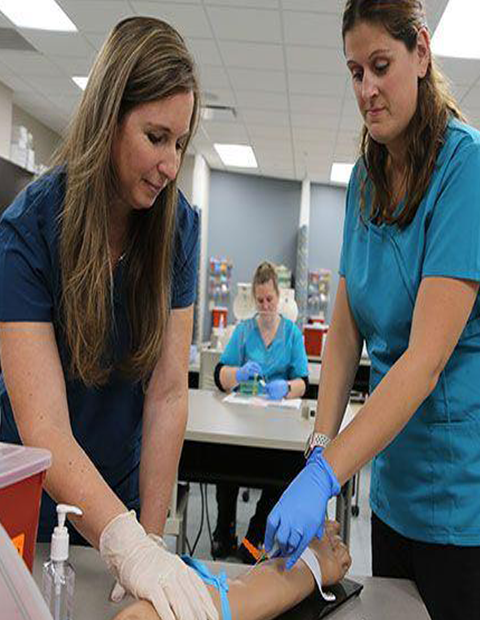
Prepare for a career as a Certified Phlebotomy Technician (CPT) and learn what it takes to be successful in this industry through this interactive and immersive course. This course will prepare you for the Certified Phlebotomy Technician (CPT) certification exam through the National Healthcareer Association (NHA).
Phlebotomy Technician
-
Duration: 8-11 Weeks
-
On Campus | Online
-
Hands On Training
Become a HealthCare Professional!
Request more info
ADDRESS
14521 Old Katy Rd, Suite 200, Houston, TX 77079
PROGRAM METHOD
ON CAMPUS | ONLINE
Program Objective
This program prepares students to collect blood specimens from clients for the purpose of laboratory analysis.Classes includes terminology, anatomy and physiology, blood collection procedures and training in skills and techniques to perform puncture methods.
Program Description
The course is embedded within the Medical Assistant path if that’s something you want to pursue in the future. You’ll have one less course to take.
At the end of the Program, the student will master the functions of a Phlebotomy Technician:
- Patient Interaction: Phlebotomy technicians must interact with patients in a friendly and reassuring manner. They explain the blood collection process, address any concerns or fears, and ensure the patient feels comfortable during the procedure.
- Patient Identification: Before collecting blood, the technician verifies the patient’s identity to ensure that the samples are correctly labeled and matched to the right individual.
- Venipuncture: The phlebotomy technician performs venipuncture, which involves using a sterile needle to puncture a vein and draw blood. They must have the skills to locate suitable veins and execute the procedure efficiently and safely.
- Skin Puncture (Capillary Blood Collection): In some cases, blood samples can be collected through skin puncture, typically done on the fingertip for small children or when only a small amount of blood is needed.
- Labeling and Handling: After collecting blood, the technician labels the blood vials with the patient’s information and carefully handles and stores the samples for transport to the laboratory.
- Infection Control: Phlebotomy technicians adhere to strict infection control procedures to prevent the transmission of infections between patients and themselves.
- Record Keeping: Accurate record-keeping is essential. Phlebotomy technicians document the blood collection process, including the date, time, patient information, and any complications that may have occurred.
- Specimen Processing: In some settings, the phlebotomy technician may also be responsible for processing blood samples in the laboratory, such as centrifuging the samples to separate serum or plasma from blood cells.
- Equipment Maintenance: Technicians are often tasked with maintaining and cleaning their phlebotomy equipment to ensure it functions properly and remains sterile.
- Collaboration with Medical Staff: Phlebotomy technicians work closely with other healthcare professionals, such as nurses and laboratory personnel, to coordinate blood collection and ensure that accurate and timely results are obtained.
After completing the program, students are eligible to sit for the Certified Phlebotomy Technician (CPT) certification exam through the National Healthcareer Association (NHA).
